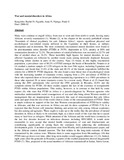| dc.description.abstract | Many wars continue to engulf Africa, from east to west and from north to south, leaving many Africans severely traumatized (1). Musisi (2), in his chapter in the recently published volume "Essentials of clinical psychiatry for sub- Saharan Africa", reports significant physical and psychological war-related trauma inflicted to the Ugandans in their homes, at military checkpoints and in detention. The most commonly encountered mental disorders were found to be post-traumatic stress disorder (PTSD) at 39.9%, depression at 52%, anxiety at 60% and somatization disorder at 72.2%. The prevalence of suicidal behaviour was recorded as 22.7% and that of alcohol abuse as 18.2%.
These incredibly high figures for mental disorders in war-affected Ugandans are reflected by another recent study among internally displaced Kenyans following ethnic clashes in parts of the country. Njau (3) found, in this highly traumatized population, a prevalence rate of 80.2% of PTSD amongst the heads of households. Neuner et al (4) studied a random sample of 3,339 refugees in the west Nile region, including Ugandans and Sudanese, and found that 31.6% of the male and 40.1% of the female respondents fulfilled the criteria for a DSM-IV PTSD diagnosis. He also found a near linear rise of psychological strain with the increasing number of traumatic events, ranging from a 23% prevalence of PTSD in those who reported three or fewer pre-defined traumatizing experiences to a 100% prevalence in those who reported 28 or more traumatic events. In a recent study, Pham et al (5) found that, among the 2091 participants who survived the 1994 genocide in Rwanda, 24.8% met the symptom criteria for PTSD.
All these studies support the fact of the existence of recognizable PTSD within African populations. This reality, however, is in contrast to that held by some experts (6) who state that PTSD in Africa is a pseudo-diagnosis by Western agencies who medicalize understandable social consequences of war and who bring about Western models of management that are inappropriate. It is precisely this type of misconception that sets Africa aside and apart from the rest of the world when it comes to the conceptualization of PTSD. There is ample evidence in support of the fact that Western conceptualizations of PTSD have validity in Africans, and that war survivors in Africa can and do show symptoms of PTSD (7-9).
It is expected that this Forum will stimulate thinking and action not only among African academics but also among aid agencies. These ought to wake up to the reality that the prevalence of mental disorders in Africa is likely to be extremely high, as a direct result of the wars that have caused many to lead lives as refugees.
While attention of the Africans and the world have (correctly) in the last few decades focused on infectious diseases including HIV/AIDS, it would seem reasonable to now accept that mental health consequences of war and displacement are contributing significantly in setting back the continent from achieving the millennium development goals.
A number of questions arise from Murthy and Lakshminarayana's paper, and in the African context demand answers. The first relates to the longterm outcome of those traumatized by the various wars. Whereas there is some suggestion from Mozambique (10) that PTSD rates go down over time, other long-term studies would suggest otherwise (11,12). Indeed, eight years after the genocide in Rwanda, a quarter of the studied population showed diagnosable PTSD (7).
This, projected to the actual numbers of Africans traumatized in Sudan, Sierra Leone, Democratic Republic of Congo, Ivory Coast, Somalia and other parts of Africa, translates to millions of people in need of help.
Community interventions such as those tried in Mozambique (10) hold some promise, as do initiatives such as the South Africa Truth and Reconciliation Commission (13). | en |

